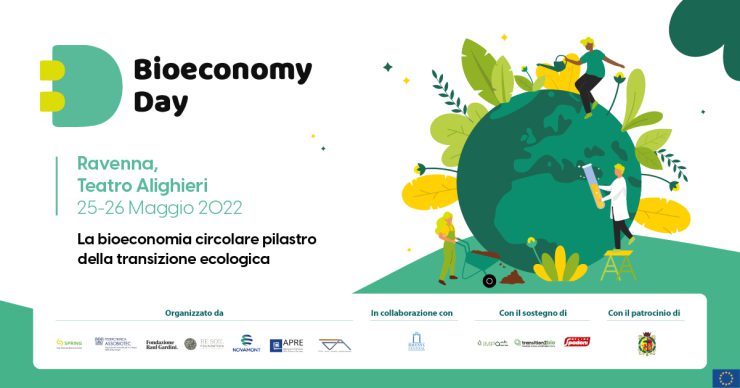The Bioeconomy Day 2022 took place in Ravenna, Italy, hosted by Alighieri Theatre, on the 25th and 26th of May. The initiative was launched by the Cluster SPRING (the Italian Cluster of Circular Bioeconomy), in collaboration with Assobiotec-Federchimica, Raul Gardini Foundation, APRE and FVA representing the European funded project Transition2Bio, Novamont and Re Soil Foundation and the European Bioeconomy Network.

The two days stimulated the debate on the importance of embracing a radical paradigm shift in the current model for the economic development, with the aim of making it more sustainable. The event engaged major Italian players from the economic and financial sectors (e.g. Novamont, Confagricoltura, Coldiretti, Orogel, ABI, Intesa San Paolo, etc.) but also important stakeholders, representatives of the Academia and policymakers. The festival also hosted Gunter Pauli, economist, entrepreneur, author and founder of the Blue Economy model. Together with the round tables and speeches, the awarding ceremony of the school competition “Bioeconomy4YOU” took place during the second day of the festival, which was entirely dedicated to young generations and their role in the green transition.
The first round table was about the role of circular bioeconomy as pillar of the ecological transition, with a special focus on the importance of communicating the bioeconomy, an activity promoted by many European funded projects like BIOVOICES and Transition2Bio, in this occasion represented by Chiara Pocaterra (APRE) and Susanna Albertini (FVA). The book for kids “what’s bioeconomy”, translated in 12 languages and distributed in more than 20.000 copies, was presented as a success story.

“The circular bioeconomy is necessary to drive the ecological transition and increase the competitiveness of our country”, said Catia Bastioli, A.D. of Novamont and President of Cluster SPRING, who also added that this operation requires a systemic approach to support the value chain creation, as well as to develop eco-design and increase the biodegradability of products.

Two key examples on how bioeconomy in Italy is a strong sector lead by women were also presented with the participation Silvia Buzzi, Caviro Extra’s HSE & Sustainability Manager and Carla Marchioro, Director of the R&D division of Endura SpA. Silvia shown how her company – which is part of the largest wine cooperative in Italy – is engaged “in extracting added value compounds from all residues products of winemaking”. On the other hand, Carla explained how her company is a world leader in the production of Piperonyl Butoxide (PBO), which can be extracted from sassafras oil, but also synthesised by recycling solvents.

During the two days of the festival, the BioArt Gallery exhibition was displayed in the “Sala Corelli” with 24 panels showcasing the potential of the circular bioeconomy in everyday life, through practical examples of application of renewable materials, including residues, to produce bio-based solutions in different sectors.
Bioeconomy4YOU, the role of young generations
The second day of the Bioeconomy Day, was entirely dedicated to students, young people and teachers and the main event was the awarding ceremony of the Bioeconomy4YOU school competition, organized by Re Soil Foundation in collaboration with Cluster SPRING, Raul Gardini Foundation, Novamont and Transition2Bio (APRE e FVA). The aim of the contest was to raise awareness, inform and educate young generations on these topics, collecting and awarding the most creative ideas on how they imagine their future in the circular bioeconomy.

41 applications were submitted to the competition, which was divided in four different categories:
- Primary schools
- Secondary schools
- High Schools, with two different categories, “bio-product” and “Our bio-future”
- Teachers

The jury selected the best ideas, taking into account the originality and creativity of the proposal, the correct identification of an environmental problem, the quality and clarity of presentation and the consideration of the entire life cycle of the product.
Winning students and teachers were awarded with money prizes, educational materials, bio-based gadgets, books and magazines.


